BenJepheneT
Light Up Gold - Parquet Courts
- Joined
- Jul 14, 2019
- Messages
- 5,344
- Points
- 233
Long story short, I can't sleep.
Since I have time, I decided to burn it by writing an essay on one of my favourite games of all time. It's a little forgotten gem from a franchise considered overdone at the time by most but still holds a special place in my heart. It's a behemoth to me as a child, a thorn to my completionist OCD as a teen, and now an inviting warmth I return to repeatedly without fatigue. The eleventh entry into the Need for Speed series. Need for Speed: Pro Street.

At this point in the franchise's history, many people saw this game as a misstep. From the drastic change to the handling scheme (for the uninitiated, just imagine if Call of Duty became Escape from Tarkov) to the restriction from arcade open-world free-roaming to simcade (half simulation, half arcade) closed circuit racing, it wasn't a popular entry into the franchise. Even as an avid fan of the game now, I empathized with its past reception. Before this came juggernauts like Underground 2 and Most Wanted; where the former gave players an open world to rip their tyres across while the latter had cop chases with an intensity only rivalled by GTA to this day. In this one, you just raced in bendy circles with four other dudes. I understood why it was dismissed during its release.
With hindsight, however, one could see why it became a cult classic among fans of arcade racing games. From its engaging tuning system, the archaic but in-depth customization options, and the structured progression; it didn't tick boxes with mainstream fans but it did offer what most racing game fans ever want from an entry with all the grungy grace of the late 2000s era that people seem to be going back to these days. If you got an alt emo e-girl with a passing interest in autos you want to impress, just stream one of these in the Discord call and she'd be pegging you in no time.
Though the mechanics are what make the game fun, it wasn't the thing that made the game memorable or elevated it to such a favourable status to me. There are a handful of racing games that had the same features as Pro Street; or even arguably did them better. None of them, however, had what is Pro Street's strongest flair in its repertoire.
Mainly, the setting and atmosphere.
There's simply nothing like it, even until today.

There's just something about Pro Street's art style that sticks to me even after a good decade and a half of its release. The dull tint of the asphalt and the muted colours of the barriers sit in perfect contrast with the abundance of saturation from the surrounding graffiti and sponsorship billboards. There is no wasted space in any of the tracks; if there is a spot for a spray can to glide over, you can bet it's been molested by God's rainbow.
This extends beyond the playing area and onto the players themselves. Contrary to most legal racing automobiles, the ones in Pro Street are more akin to empty bodies you'd find sitting next to a boarded apartment in the ghetto; contorted and vandalized to visual extremities where the line between artistry and psychosis starts to blur. There's no such thing as grace or elegance in this game. Doors WILL be in mismatched colours, spoilers the size of picnic benches, bumpers that will undoubtedly meet car Jesus if it ever goes over a bump, colourblind colour schemes, and decal work that can only be conceived by schizophrenics.
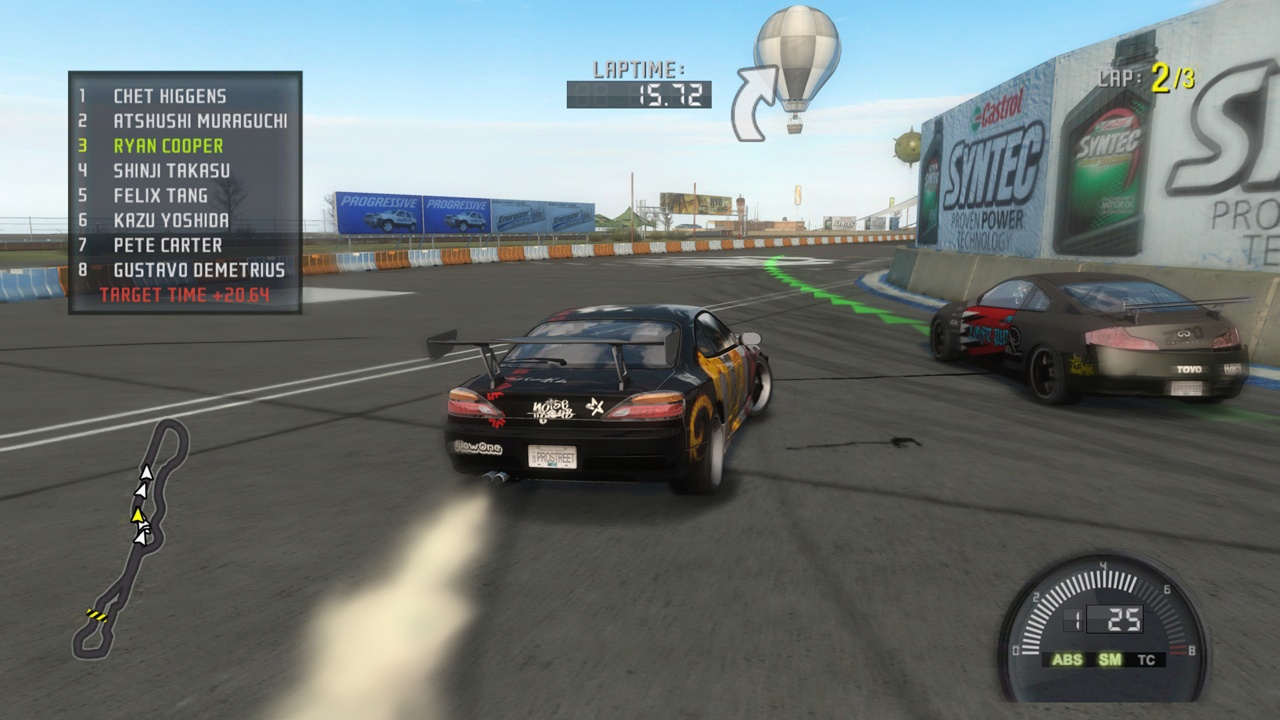

Those with keen eyes will realize, however, that my descriptions aren't exclusive to this game alone. If we were to talk about sticker bombs and the abundance of corporate icons, you needn't look further to find contemporary adopters of such style. Just a year after Pro Street's release, Race Driver: Grid hit store shelves and became the next big hit for closed circuit arcade racer fans. It too had a memorable atmosphere that though stank in the horribly aged brown tint that (de)saturated the market at the time, still held to its own with its bold presentation.
Hell, if you want to move away from the late 2000s, the early 2020s are also adopting this style. Hell, Codemasters (the same team behind the aforementioned Race Driver: Grid) is responsible for the annual F1 game series, and they're slowly moving away from the corporatist professionalism in their earlier titles to a more casual (stylistic, even) approach to their art style.
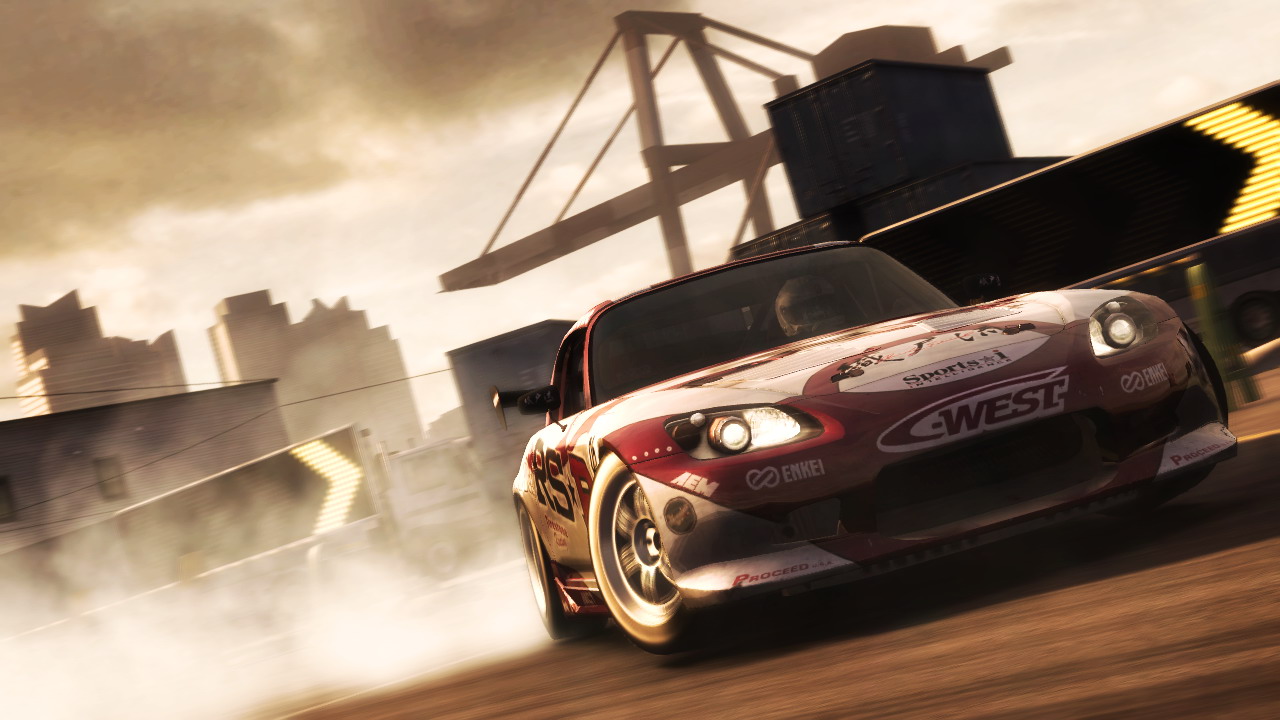
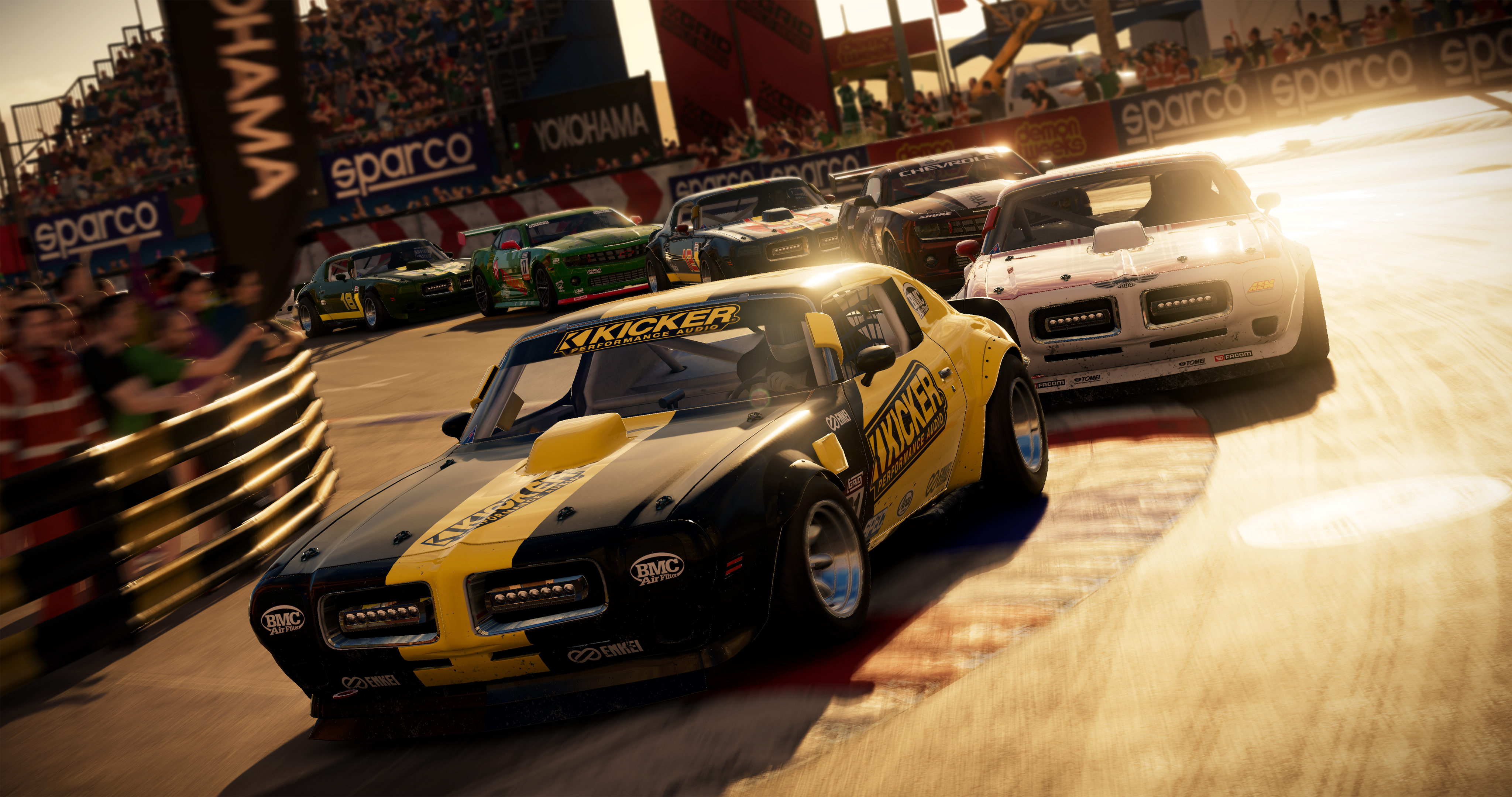
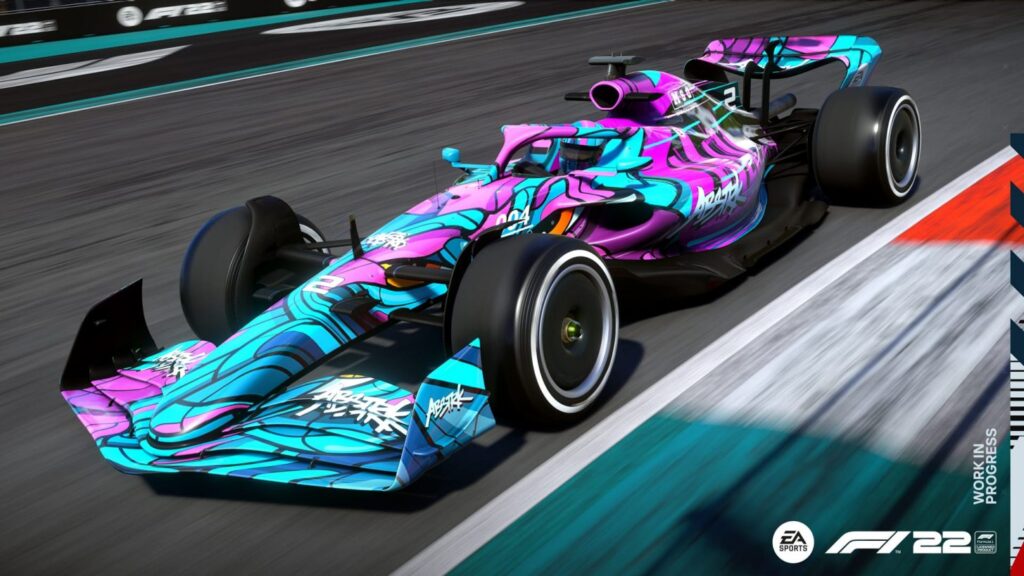

So now you may ask me: "What sets your golden horse from all the others in the stable?"
My answer would be context.
See, in both Race Driver: Grid and F1 2022, you're driving for a team, managing resources for RnD to get better upgrades. Your opponents extend beyond the drivers on the track, you're also wrestling and fetching sponsors to further fund your career to the next level. Sometimes your opponents become your sworn enemy if you bully them too much during gameplay.
In Pro Street, you play as Ryan Cooper, an ex-street racer turned legal. You have no team; a lone wolf. There's no resource managing beyond race winnings, and your RnD is basically what kinda upgrade you can afford in the market. Your opponents don't need to be bullied to be your enemy; the AI system actively makes rookie mistakes, shooting way over the braking line, crashing into other racers, and french-kissing concrete barriers. You're not professional drivers, just amateurs with some talent and deep enough pockets to borrow mom's grocery getter and turn them into something worthwhile.
In layman terms, in the other mentioned games, it's your team and sponsors against the other teams and their sponsors. In Pro Street, it's just you against the world.
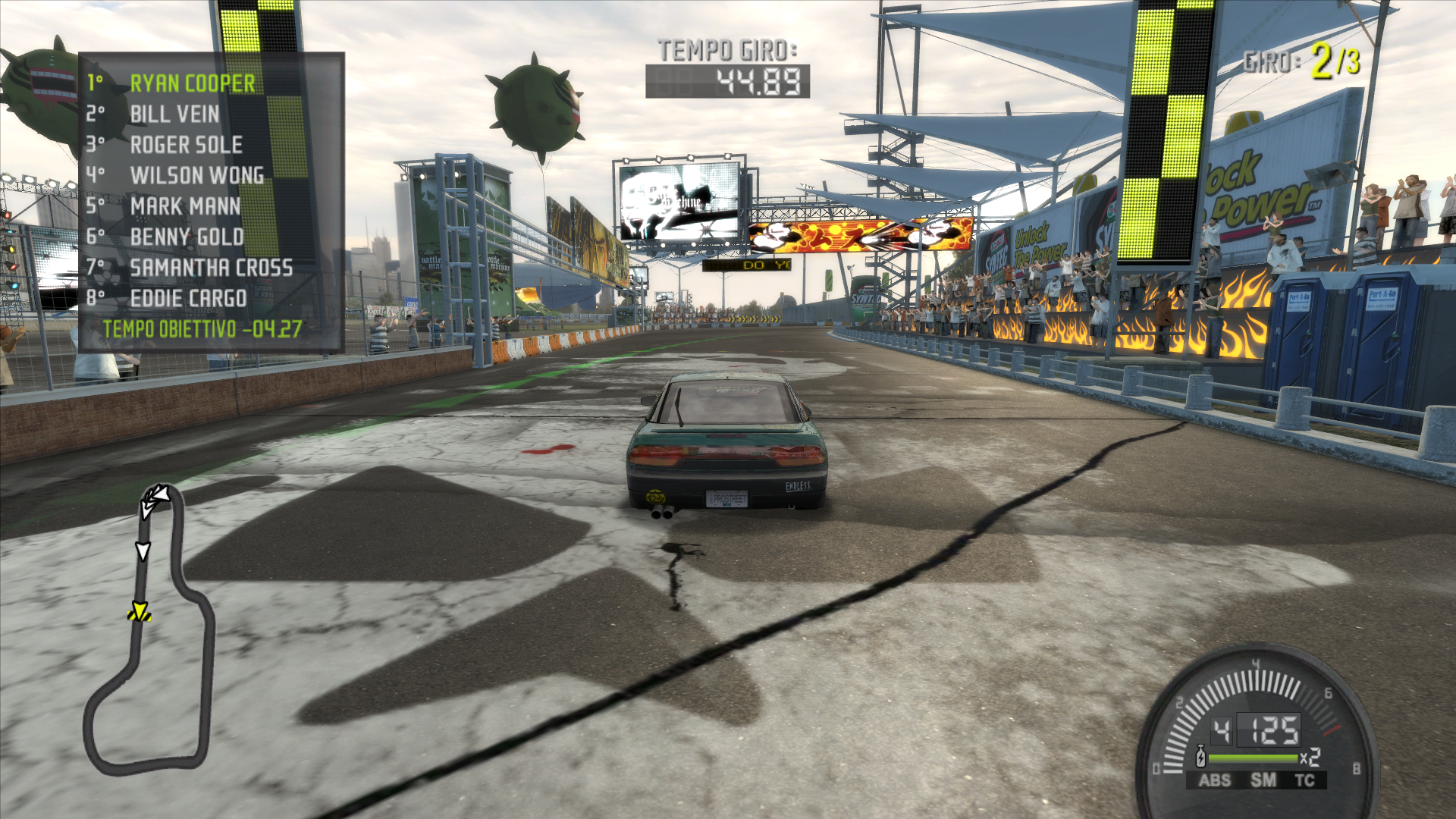
Allow me to elaborate.
There's always this prevailing feeling of corporatism in games with these similar art styles. No matter how fast your land rocket goes you're always bombarded with ads promoting Progressive Insurance or Castrol engine oils. Even passing your opponents carries the same sensation. You'd be hard-pressed to find a car that isn't littered with sponsorships and paid names. Even in the most remote of tracks, you can always be sure that Brembo will be there to remind you who's got the best brakes in town.
What sets Pro Street apart from all the others is the way it treats these companies and sponsors. In Race Driver: Grid, you're looking to place your sponsors in the most obvious spots possible on your car. You want other people to know who's responsible for turning your ride into a beast, as they're the ones paying your team's bills.


In Pro Street, however, sponsor names are often pushed to the side in favour of team names, or obscured beneath vinyl and decals. In most designs you'd find in the game, sponsorships are either treated as an afterthought or used to promote the visuals, rather than vice versa.

If it isn't spelt out enough for you, let me say it directly: in Pro Street, you take no shit from nobody. You're racing for you and yourself only. Yes, you'll find that your AI opponents do have their team names plastered across their hoods and doors, but it extends further than the name itself. Each team has its own set of visual styles and colour schemes, reinforcing their spirit more so than in the other games where the best similarity you can draw between your driver and your teammate is an exclusive two-tone.


It's the sense of individualism and the underdog status of your character that helped sear this game into my head some 15 years later after its release and my initial playthrough. The racing itself is fine and all, but when I can get the same thing everywhere else, you'd have to have something that sets yourself apart from all the others. Pro Street did just that and more.
As a final addendum, I'd like to discuss Pro Street's story. It is of general consensus that racing games generally do not have good stories (Driver: San Francisco is the exception that proves the rule), and Pro Street is no different. It isn't egregious more so that it's bare bones, only to serve the story. But like a sprinkle of much-needed seasoning on a grilled slice of beef, it's what ties the game's visual style together with the gameplay to form the final product.
Picture this: you enter a small-town Race Day and wipe the floor with the competitors. The MC notices your exploits and sings your praises. Sitting beside the DJ, however, is the Street King: a name only bestowed onto racers who have raced to the top of the league, dominated every Race Day across the world and set records on every track in every discipline, from Drift events to Drag strips, Speed highways and tight Grip tracks. The current Street King's reaction to your racing is nothing but a sneer and a snarky remark. You may have won the day, but to him, you're the frog who croaked a little louder than the others.
Hence, you go on a tour spanning across the globe, attending Race Days and competing against street racers across the world. You take your hard-earned winnings and fix your little pony into a stallion. The same rust bucket that rattled every time you make a turn is now gunning down Nevada at triple-digit speeds. You decide to carve an identity for yourself, spraying your exclusive creativity across your ride. The MC recognizes your winning streak and says your name a little louder, letting people know who turned up on the grid and why they should be terrified of your presence. The other prominent racers are starting to notice your name, elevating your status from a rival to a threat. High-ranking teams start taking you seriously, giving you invites to exclusive Race Days so they could prove you are nothing but a fluke, only for you to wipe them in their home tracks.
Finally, with your presence being too loud to ignore, the Street King and his goons extend their hands to you. Now you're facing the King who couldn't bear to set sight on you, now with nothing but your destruction as his priority.
In Race Driver: Grid, you win a championship.
In F1 2022, you get a trophy.
In Need for Speed: Pro Street, you become the Street King.
A title. A name. An eternal proclamation of complete domination. A claim that you're unrivalled beneath the sun, undefeated by anyone.

You didn't win because you had more lucrative sponsorship offers or because your RnD team was more technologically advanced than the others; you won because you were better than the others.
You won because you were stronger than the others. You won because you were hungrier than the others.
You simply won because you're faster. Faster than all the others. Faster than anyone had ever seen before.

You proved to the world that you needed nothing but your strength and headstrong determination to rule the world. You didn't need a blank cheque or a parade of mechanics and backup racers and teammates to take you to the top. All you had was bottomless willpower, an engine and a good set of tools, and a famished need for speed.
If that doesn't cement a sensation of power in your bowels, I don't know what else will.
Since I have time, I decided to burn it by writing an essay on one of my favourite games of all time. It's a little forgotten gem from a franchise considered overdone at the time by most but still holds a special place in my heart. It's a behemoth to me as a child, a thorn to my completionist OCD as a teen, and now an inviting warmth I return to repeatedly without fatigue. The eleventh entry into the Need for Speed series. Need for Speed: Pro Street.

At this point in the franchise's history, many people saw this game as a misstep. From the drastic change to the handling scheme (for the uninitiated, just imagine if Call of Duty became Escape from Tarkov) to the restriction from arcade open-world free-roaming to simcade (half simulation, half arcade) closed circuit racing, it wasn't a popular entry into the franchise. Even as an avid fan of the game now, I empathized with its past reception. Before this came juggernauts like Underground 2 and Most Wanted; where the former gave players an open world to rip their tyres across while the latter had cop chases with an intensity only rivalled by GTA to this day. In this one, you just raced in bendy circles with four other dudes. I understood why it was dismissed during its release.
With hindsight, however, one could see why it became a cult classic among fans of arcade racing games. From its engaging tuning system, the archaic but in-depth customization options, and the structured progression; it didn't tick boxes with mainstream fans but it did offer what most racing game fans ever want from an entry with all the grungy grace of the late 2000s era that people seem to be going back to these days. If you got an alt emo e-girl with a passing interest in autos you want to impress, just stream one of these in the Discord call and she'd be pegging you in no time.
Though the mechanics are what make the game fun, it wasn't the thing that made the game memorable or elevated it to such a favourable status to me. There are a handful of racing games that had the same features as Pro Street; or even arguably did them better. None of them, however, had what is Pro Street's strongest flair in its repertoire.
Mainly, the setting and atmosphere.
There's simply nothing like it, even until today.


There's just something about Pro Street's art style that sticks to me even after a good decade and a half of its release. The dull tint of the asphalt and the muted colours of the barriers sit in perfect contrast with the abundance of saturation from the surrounding graffiti and sponsorship billboards. There is no wasted space in any of the tracks; if there is a spot for a spray can to glide over, you can bet it's been molested by God's rainbow.
This extends beyond the playing area and onto the players themselves. Contrary to most legal racing automobiles, the ones in Pro Street are more akin to empty bodies you'd find sitting next to a boarded apartment in the ghetto; contorted and vandalized to visual extremities where the line between artistry and psychosis starts to blur. There's no such thing as grace or elegance in this game. Doors WILL be in mismatched colours, spoilers the size of picnic benches, bumpers that will undoubtedly meet car Jesus if it ever goes over a bump, colourblind colour schemes, and decal work that can only be conceived by schizophrenics.


Those with keen eyes will realize, however, that my descriptions aren't exclusive to this game alone. If we were to talk about sticker bombs and the abundance of corporate icons, you needn't look further to find contemporary adopters of such style. Just a year after Pro Street's release, Race Driver: Grid hit store shelves and became the next big hit for closed circuit arcade racer fans. It too had a memorable atmosphere that though stank in the horribly aged brown tint that (de)saturated the market at the time, still held to its own with its bold presentation.
Hell, if you want to move away from the late 2000s, the early 2020s are also adopting this style. Hell, Codemasters (the same team behind the aforementioned Race Driver: Grid) is responsible for the annual F1 game series, and they're slowly moving away from the corporatist professionalism in their earlier titles to a more casual (stylistic, even) approach to their art style.




So now you may ask me: "What sets your golden horse from all the others in the stable?"
My answer would be context.
See, in both Race Driver: Grid and F1 2022, you're driving for a team, managing resources for RnD to get better upgrades. Your opponents extend beyond the drivers on the track, you're also wrestling and fetching sponsors to further fund your career to the next level. Sometimes your opponents become your sworn enemy if you bully them too much during gameplay.
In Pro Street, you play as Ryan Cooper, an ex-street racer turned legal. You have no team; a lone wolf. There's no resource managing beyond race winnings, and your RnD is basically what kinda upgrade you can afford in the market. Your opponents don't need to be bullied to be your enemy; the AI system actively makes rookie mistakes, shooting way over the braking line, crashing into other racers, and french-kissing concrete barriers. You're not professional drivers, just amateurs with some talent and deep enough pockets to borrow mom's grocery getter and turn them into something worthwhile.
In layman terms, in the other mentioned games, it's your team and sponsors against the other teams and their sponsors. In Pro Street, it's just you against the world.

Allow me to elaborate.
There's always this prevailing feeling of corporatism in games with these similar art styles. No matter how fast your land rocket goes you're always bombarded with ads promoting Progressive Insurance or Castrol engine oils. Even passing your opponents carries the same sensation. You'd be hard-pressed to find a car that isn't littered with sponsorships and paid names. Even in the most remote of tracks, you can always be sure that Brembo will be there to remind you who's got the best brakes in town.
What sets Pro Street apart from all the others is the way it treats these companies and sponsors. In Race Driver: Grid, you're looking to place your sponsors in the most obvious spots possible on your car. You want other people to know who's responsible for turning your ride into a beast, as they're the ones paying your team's bills.

If it isn't spelt out enough for you, let me say it directly: in Pro Street, you take no shit from nobody. You're racing for you and yourself only. Yes, you'll find that your AI opponents do have their team names plastered across their hoods and doors, but it extends further than the name itself. Each team has its own set of visual styles and colour schemes, reinforcing their spirit more so than in the other games where the best similarity you can draw between your driver and your teammate is an exclusive two-tone.


It's the sense of individualism and the underdog status of your character that helped sear this game into my head some 15 years later after its release and my initial playthrough. The racing itself is fine and all, but when I can get the same thing everywhere else, you'd have to have something that sets yourself apart from all the others. Pro Street did just that and more.
As a final addendum, I'd like to discuss Pro Street's story. It is of general consensus that racing games generally do not have good stories (Driver: San Francisco is the exception that proves the rule), and Pro Street is no different. It isn't egregious more so that it's bare bones, only to serve the story. But like a sprinkle of much-needed seasoning on a grilled slice of beef, it's what ties the game's visual style together with the gameplay to form the final product.
Picture this: you enter a small-town Race Day and wipe the floor with the competitors. The MC notices your exploits and sings your praises. Sitting beside the DJ, however, is the Street King: a name only bestowed onto racers who have raced to the top of the league, dominated every Race Day across the world and set records on every track in every discipline, from Drift events to Drag strips, Speed highways and tight Grip tracks. The current Street King's reaction to your racing is nothing but a sneer and a snarky remark. You may have won the day, but to him, you're the frog who croaked a little louder than the others.
Hence, you go on a tour spanning across the globe, attending Race Days and competing against street racers across the world. You take your hard-earned winnings and fix your little pony into a stallion. The same rust bucket that rattled every time you make a turn is now gunning down Nevada at triple-digit speeds. You decide to carve an identity for yourself, spraying your exclusive creativity across your ride. The MC recognizes your winning streak and says your name a little louder, letting people know who turned up on the grid and why they should be terrified of your presence. The other prominent racers are starting to notice your name, elevating your status from a rival to a threat. High-ranking teams start taking you seriously, giving you invites to exclusive Race Days so they could prove you are nothing but a fluke, only for you to wipe them in their home tracks.
Finally, with your presence being too loud to ignore, the Street King and his goons extend their hands to you. Now you're facing the King who couldn't bear to set sight on you, now with nothing but your destruction as his priority.
In Race Driver: Grid, you win a championship.
In F1 2022, you get a trophy.
In Need for Speed: Pro Street, you become the Street King.
A title. A name. An eternal proclamation of complete domination. A claim that you're unrivalled beneath the sun, undefeated by anyone.

You didn't win because you had more lucrative sponsorship offers or because your RnD team was more technologically advanced than the others; you won because you were better than the others.
You won because you were stronger than the others. You won because you were hungrier than the others.
You simply won because you're faster. Faster than all the others. Faster than anyone had ever seen before.

If that doesn't cement a sensation of power in your bowels, I don't know what else will.
